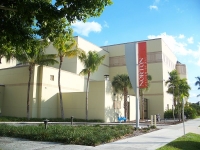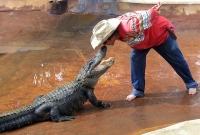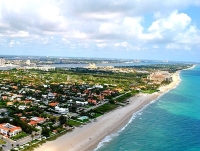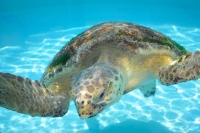City guides


Gold Coast Travel Guide
The Gold Coast stretches for about 60 miles (97km) down Florida's southeast coast, from Palm Beach in the north to Miami Beach in the south. This stretch of coastline hosts a string of tropical beach resorts that are very popular with visitors to Florida. The Gold Coast strip currently attracts close on nine million holidaymakers every year. Development is proceeding apace as the natural landscape of sprawling grassland is replaced with opulent resorts and high-rise apartment blocks. The larger resort cities along the coast, West Palm Beach, Fort Lauderdale and Hollywood, are experiencing unprecedented building booms as the number of immigrants rises. Visitors and residents alike come to enjoy the natural attractions of the area, the laid-back atmosphere, the almost constant warm, sunny weather, the luxurious 'country-club' lifestyle, and the hundreds of sophisticated shopping malls. The best way to explore it all is to take a meander by car along Florida A1A, which is a narrow road that winds along the coast connecting the long thin barrier islands. Alternatively, visitors can pick a resort, kick off their shoes and enjoy a summer holiday any time of year.
Things to do in Gold Coast
The main attractions of the Gold Coast are the glamorous hotels and resorts, beaches, and the upmarket shopping malls. There are also cultural and natural attractions for sightseers who manage to leave the beach. Scuba divers and snorkelers in the region would do well to pay a visit to the Biscayne National Park, while those wanting to meet some of the local wildlife will find a number of animal rehabilitation and conservation centres, including the Gumbo Limbo Environmental Complex in Boca Raton, and the Loggerhead Marinelife Center of Juno Beach. Those wanting a taste of the indigenous local culture should visit the Big Cyprus Seminole Reservation, west of Fort Lauderdale, where the American Indian heritage of Florida is showcased.

Norton Museum of Art
Art lovers should not miss out on the Norton Museum of Art, which is one of Florida's major cultural attractions. Located in the upmarket West Palm Beach area, the museum's permanent collection is internationally renowned, and includes European, American, Chinese, and contemporary art from the Renaissance through to the present. The museum regularly hosts travelling exhibitions and offers educational programmes for children. There's a museum shop and restaurant serving refreshments. Guided tours are available. Photography is allowed in certain parts of the museum, but not in many of the exhibition areas. Visitors should be sure to ask permission before taking a photo.

Seminole Reservation
An hour west of Fort Lauderdale, on the road to Naples, travelors can visit the Big Cypress Seminole, where Florida's 'unconquered' Indian tribe still reside. The Ah-Tah-Thi-Ki Museum in the reservation features historical exhibits and a living village where visitors can watch artisans at work. There's also a nature trail to explore, and a film on Seminole history is shown regularly. Apart from the many interesting cultural artifacts on display, panoramic scenery at the reservation is spectacular, showcasing some of the typical everglades' flora and fauna. The Big Cypress Seminole Reservation is the ideal place to immerse oneself in the American Indian heritage of Florida.

Palm Beach
Palm trees arrived at Palm Beach in 1878, when a ship laden with Cuban coconuts was wrecked on the offshore barrier island that is only 14 miles (23km) long and half a mile (1km) wide. Palm Beach has long been the traditional winter holiday home of America's aristocracy, such as the Kennedys, Rockefellers and other society names filling the Gatsby-era mansions on the island. Henry Morrison Flagler put Palm Beach on the map in 1894 when he opened the Royal Poinciana Hotel on the island and promoted Palm Beach as America's premier winter resort. The mansion Whitehall, which he built in 1901 for his wife, is now the Flagler Museum dedicated to his memory. Today there are many more hotels in Palm Beach, and hundreds of restaurants, some of which rank among the finest in the world.

Loggerhead Marinelife Center
Over thirty years ago Juno Beach resident Eleanor Fletcher, affectionately known locally as 'the Turtle Lady', began assembling a collection of turtle artefacts and information that has grown to become the Marinelife Center on the oceanfront at Loggerhead Park, which monitors turtles along the Gold Coast. The Center is essentially a turtle hospital, and visitors can see ill and injured creatures being rehabilitated. The Center has numerous exhibits, including tropical fish and shells, and a gift shop. Evening guided 'turtle walks' are offered during June and July, but bookings must be made in advance. There are a number of other guided tours, hikes and talks available.
United States of America travel info
Electricity
The electrical current is 120 volts, 60Hz. Plugs are mainly the type with two flat pins, though three-pin plugs (two flat parallel pins and a rounded pin) are also widely used. European appliances without dual-voltage capabilities will require an adapter.
Language
English is the most common language spoken but Spanish is often heard in the south-western states.
Money
The official currency is the US Dollar (USD), which is divided into 100 cents. Only major banks exchange foreign currency. ATMs are widespread and credit cards are widely accepted; Apple Pay and Google Pay are very popular. Banking hours are Monday to Friday 9am to 3pm.
Tipping
A 15 percent tip is expected by taxi drivers, bartenders, hairdressers and waiters, but travellers shouldn't tip in fast-food or self-service restaurants. In expensive restaurants or for large parties, the tip should be 20 percent of the bill. It's normal to tip staff such as valets and porters in hotels; this is discretionary, although a minimum of $5 is expected. Most services are customarily tipped if the service is good.
Health
There are no specific health risks associated with travel within the USA. Medical facilities are excellent, but expensive. Only emergencies are treated without prior payment and treatment can be refused without evidence of insurance or proof of funds. Good medical insurance is essential.
Safety
Travel within the United States is generally trouble-free, though travellers should be aware that the US shares with the rest of the world an increased threat from terrorist incidents. Security has been heightened, particularly at airports. Restrictions on hand luggage apply and travellers are advised to check on the latest situation with airlines in advance. Travellers should also be alert to the dangers of car and street crime in cities and should use common sense and take basic precautions. Hurricanes are common between June and November, putting the southern USA, including the Gulf Coast and the eastern US at risk. There's a risk of wildfires in many dry areas in the US, particularly on the West Coast from March to November.
Local customs
Laws vary from state to state, including speed limit, fines and punishment. The age at which alcohol may be legally bought and consumed is 21 years.
Doing business
In such a large country, filled with so many diverse groups, business practices may differ according to each state, though rarely to any large degree. The East Coast is traditionally more formal than the West Coast, though in states such as California, dress code and conservative appearance are as common as they would be in New York. Punctuality is important throughout the country and it's considered rude to be late for a meeting. Gift-giving is uncommon as it may be construed as bribery. Appropriate titles (Mr, Mrs, Ms) are used upon introduction and until otherwise stated. Americans favour politeness and greetings of 'Hello' and 'How are you?' are often expressed with sincerity. Business hours may vary in each state, but an 8am start and 5pm finish Monday to Friday is the most common with an hour over lunch.
Status and age are not necessarily indicative of seniority, nor do they carry much weight in themselves. Those doing business in the States should be mindful of this fact; foreigners should never make assumptions about someone's position or rank. Best practice is to be respectful to all parties. That said, the US upholds a hierarchal business structure in which 'the boss' is the ultimate decision-maker. Senior leaders have the power of the last word, and can go against the grain just as easily as they can follow popular opinion. Foreigners should concentrate on winning over this individual, even if the greater group seems unsupportive. Americans value a direct style of communication. In this fast-paced, consumer culture 'time is money', and small-talk is viewed as unnecessary and wasteful. It's best for foreigners to get to the point quickly, speak about issues in a frank and open manner, and to avoid taking offence if someone questions or challenges them outright.
Duty free
Travellers to the United States who are returning residents of the country do not have to pay duty on articles purchased abroad to the value of $800 provided their stay was longer than 48 hours and their duty-free allowance was not used in the 30-day period prior. For passengers arriving from Samoa, Guam and the U.S. Virgin Islands, a duty-free allowance of $1,600 is allowed. The following items are included in this: 50 cigarettes and 10 cigars and 150 millilitres (5 fl. oz.) of alcoholic beverages or 150 millilitres (5 fl. oz.) of perfume containing alcohol. Restrictions may apply to goods from Cuba, Iran, North Korea, Burma (Myanmar), Angola, Liberia and Sudan. It is prohibited to import Cuban cigars from any country.
Travellers to the United States who are non-residents do not have to pay duty on the following items: 50 cigars or 200 cigarettes and gifts to the value of $100 provided their stay in the USA is not less than 72 hours and that the allowance has not been used in the preceding six-month period.
Prohibited items for residents and non-residents include meat or meat products, poultry, narcotics, absinthe, plants, seeds, vegetables, fruits, soil, live insects and other living plants or animal pests. Fish is prohibited unless it carries disease-free certification. Wildlife and animals or their by-products carry restrictions. Dairy products and eggs from specified countries are not allowed. Firearms and ammunition are not allowed without the necessary license and permit.
Communications
The international country dialling code for the United States is +1. Mobile networks cover most of the country, especially all urban areas; travellers can purchase local prepaid SIM cards for unlocked phones or use eSIMs if their cellular providers support it on their networks. WiFi is widely available.
Passport & Visa
It is highly recommended that travellers' passports have at least six months' validity remaining after the intended date of departure from them travel destination. A visa is required for short visits unless travellers qualify for entry under the Visa Waiver Program.
The Visa Waiver Program (VWP) enables citizens of certain countries to travel to the US for a stay of up to 90 days without a visa. Visitors under the VWP need a valid Electronic System for Travel Authorization (ESTA), which allows the US government to screen all visitors before travel. Visitors entering the country under the VWP must have a machine-readable passport (MRP) that has a barcode on the photo page. Travellers under the VWP must have passports that include biometrics if they wish to enter the country without a visa, which means that passports must contain unique personal data such as fingerprints or iris details. All passports must contain a digital photo image in order to travel visa-free. All visitors to the USA have a photograph and two fingerprints taken by an inkless scanner on arrival, including those travelling visa-free under the VWP.
As part of the Western Hemisphere Travel Initiative (WHTI), all travellers travelling between the United States and Canada, Mexico, Bermuda, and the Caribbean region are required to present a passport or other valid travel document to enter or re-enter the United States. If departing from the USA, a valid passport is required by immigration authorities. Immigration officials often apply different rules to those stated by travel agents and official sources.
Entry requirements
US citizens require passports.
UK nationals require a passport valid for duration of stay. Most passport holders can get an Electronic System for Travel Authorisation (ESTA) through the Visa Waiver Programme, which allows travel to the US for up to 90 days. The VWP includes tourism, certain types of business visit and transit to another country.
The most important requirement on entering the U.S. is providing proof of Canadian citizenship. A valid Canadian passport is the best document to prove Canadian citizenship and the right to return to Canada. However, several other documents can serve, depending on the mode of transport. Generally, Canadian citizens do not require visitor, business, transit or other visas to enter the United States from Canada, though there are some exceptions.
Passports must be valid for the period of intended stay. If visiting the US for fewer than 90 days, Australian nationals may be eligible to apply for an Electronic System for Travel Authorization (ESTA), and enter under the Visa Waiver Program (VWP).
South Africans must hold a passport valid for duration of stay. A visa is required.
Passports must be valid for duration of stay. Irish nationals can get an Electronic System for Travel Authorisation (ESTA) under the Visa Waiver Programme for entry into the United States.
Passports must be valid for duration of stay. New Zealand nationals can get an Electronic System for Travel Authorisation (ESTA) under the Visa Waiver Programme for entry into the United States.
Useful contacts
United States Tourist Office: www.usatourist.com
911 (General)Embassies / consulates in other countries
United States Embassy, London, United Kingdom: +44 20 7499 9000.
United States Embassy, Ottawa, Canada: +1 613 688 5335.
United States Embassy, Canberra, Australia: +61 2 6214 5600.
United States Embassy, Pretoria, South Africa: +27 12 431 4000.
United States Embassy, Dublin, Ireland: +353 1 668 8777.
United States Embassy, Wellington, New Zealand: +64 4 462 6000.
Embassies / consulates in United States of America
British Embassy, Washington DC: +1 202 588 6500.
Canadian Embassy, Washington DC: +1 202 682 1740.
Australian Embassy, Washington DC: +1 202 797 3000.
South African Embassy, Washington DC: +1 202 232 4400.
Irish Embassy, Washington DC: +1 202 462 3939.
New Zealand Embassy, Washington DC: +1 202 328 4800.


